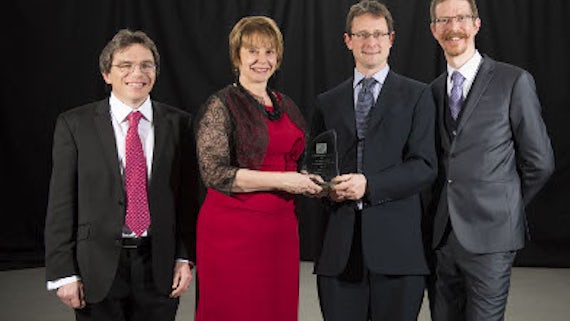Gravitational Physicists collect Vice Chancellor’s accolade
25 Tachwedd 2016

The Gravitational Physics Group of the School of Physics and Astronomy has been awarded the Vice Chancellor’s Award for Outstanding Contribution to the University, part of the Celebrating Excellence Awards for 2016.
On presenting the award the Vice Chancellor, Professor Riordan, said that the research group had made an “historic contribution to science” and that they had “contributed to a new way of seeing the world”. The award celebrates the success the group has had over the past year, including its important role in the first detection of gravitational waves – ripples in space predicted by Einstein.
The Cardiff group, which comprises over 20 members from graduate students to professors, is one of the UK’s leading research groups in gravitational physics, and is a major member of the LIGO Scientific Collaboration, which designs, builds and runs the LIGO gravitational wave observatories that made the first detections last year. Next year, the group’s activities will expand into experimental research on the detection of gravitational waves.
Head of the Gravitational Physics Group, Professor Patrick Sutton, said: “It’s wonderful to see the efforts of all members of the group acknowledged in this way. While we celebrate the past successes, we are also looking forward to building on them in the future, which is only possible thanks to the investment by the University.”
Most of the group’s work to date is related to predicting gravitational wave signals – essentially using computers to solve Einstein’s equations – and analysing the data from the LIGO experiment. The first detected gravitational waves originated from a pair of black holes, each more than 30 times the mass of our Sun, which spiralled together and merged, briefly emitting more power than all the stars in all the galaxies in the entire visible Universe.
Cardiff researchers have been involved in the search for gravitational waves since the 1980s, largely with the British-German GEO600 detector. The coming years will see a number of other detectors come online around the world, including the Virgo detector in Italy, the KAGRA detector in Japan.
Further down the line, a LIGO India detector is in the process of being designed and built, due to come online in around a decade. In the 2030s the European Space Agency is expected to launch space-based eLISA mission, and the ground-based Einstein Telescope is proposed to begin construction on a similar timescale.
Professor Mark Hannam commented: “This award comes thanks to the hard work and dedication of a large number of people here in Cardiff, past present and future. The membership of our group, and of the larger LIGO collaboration, is truly international, and we look forward to expanding our research into other areas of the field in a similar fashion”
Professor Stephen Fairhurst said: “The next few years are a crucial time in this field. We expect to see tens or even hundreds of gravitational wave signals from merging black holes, as well as signals from other cataclysmic astrophysical events”
This is far from the first time members of the Gravitational Physics Group have been in receipt of an award. Earlier this year the LIGO Scientific Collaboration received the Special Breakthrough Prize in Fundamental Physics, with every one of the thousand-strong membership sharing in the prize. The collaboration was also awarded the Gruber Cosmology prize.
Professor Matt Griffin, Head of the School of Physics and Astronomy, concluded: "The Cardiff Gravitational Physics Group continues to go from strength to strength, and this award is a great acknowledgement of their contribution to a momentous scientific advance."
A video message from the Vice Chancellor congratulating the group has been published on YouTude -- 2016 Vice-Chancellor’s Award for Outstanding Contribution to the University.